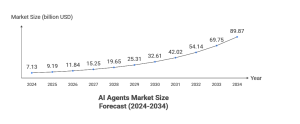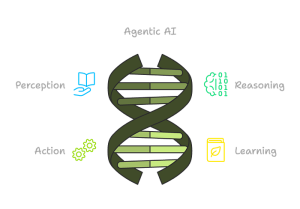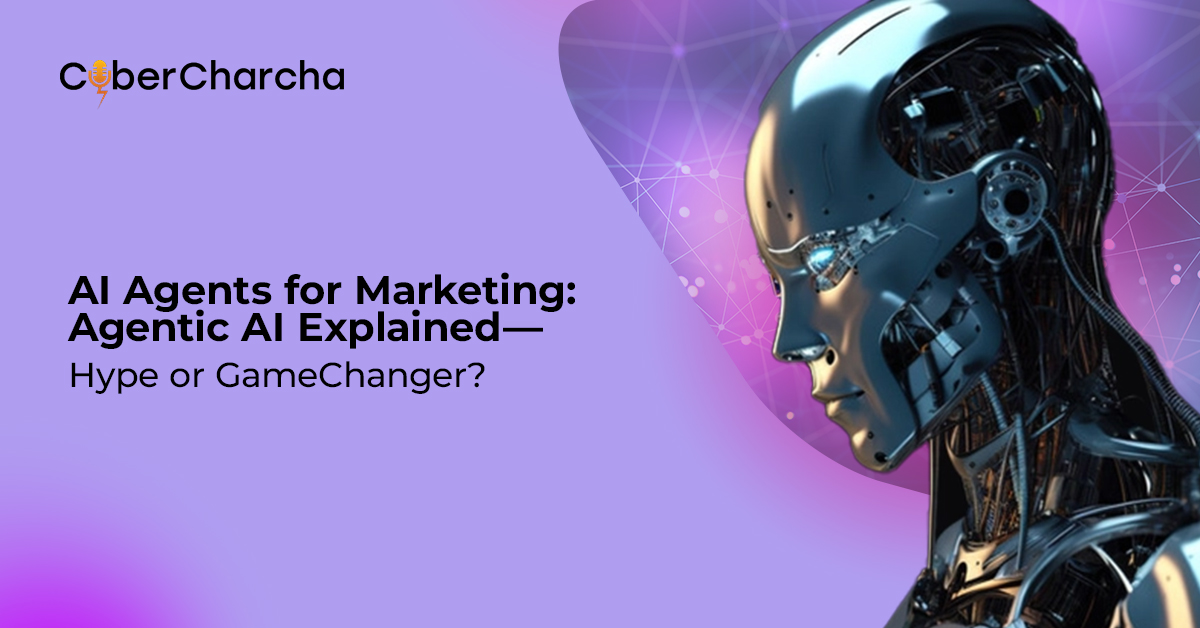What Is This Blog About?
This blog dives into how Agentic AI is reshaping B2B marketing—moving beyond traditional tools and automation to intelligent systems that act, adapt, and learn on their own. It explains the difference between AI agents and Agentic AI, explores real-world use cases, and shows why marketers need to see AI not just as a tool, but as a proactive partner in campaign design, execution, and optimization.
Who Should Read It?
- B2B Marketers & Campaign Managers looking to scale campaigns intelligently without being bogged down by manual execution
- CMOs & Marketing Leaders under pressure to deliver more with fewer resources, while staying future-ready
- Digital Transformation & IT Teams integrating next-gen MarTech into broader business systems
- Customer Experience & Data Leaders aiming to deliver real-time personalization at scale
- Business Executives & Strategy Heads evaluating AI’s role in growth, efficiency, and competitive advantage
Why Is This Important Right Now?
Marketing landscapes are shifting fast. Traditional tools are becoming obsolete, limited by rigid instructions and outdated data. Meanwhile, budgets are shrinking, buyer journeys are becoming more complex, and decision fatigue is rising. For B2B marketers, the blog serves as a go-to guide to staying relevant, competitive, and efficient with Agentic AI in an era where speed and precision are non-negotiable.
What You Can Do With This Insight?
Agentic AI isn’t just automation—it’s a smarter way to run campaigns. You can start with high-impact areas like planning, personalization, and analytics, and align with IT for smooth integration. When tied to business outcomes, it becomes the backbone of marketing—driving faster results and freeing teams to focus on strategy.
We’re at a pivotal moment in B2B marketing—where AI isn’t just enhancing workflows, but fundamentally reimagining how campaigns are created, delivered, and scaled. For IT firms managing complex distribution channels or executing high-stakes event campaigns, the question is no longer if AI matters, but how it’s changing the rules of engagement. At the heart of this shift lies a new frontier: Agentic AI preceeded by AI agents.
Once a niche concept, AI agents are now accelerating into the mainstream—ushering in a new era of intelligent marketing systems that don’t just assist but autonomously act, adapt, and evolve.
In 2024, the global AI agents market reached USD 7.13 billion, and it’s only just getting started. With a projected CAGR of 43.98%, it’s expected to hit USD 89.87 billion by 2034—driven by use cases spanning from healthcare to finance to customer service.(1)

Importance Of Agentic AI For B2B Marketers:
And now an interesting question—What makes Agentic AI different—and why should B2B marketers care?
You see, traditional marketing tools followed fixed rules. Agentic AI systems, by contrast, are designed to be goal-oriented, self-improving, and capable of complex decision-making—freeing marketers from micromanagement and enabling truly intelligent use of AI agents for campaigns automation.
This isn’t just AI-as-a-tool. It’s AI-as-a-colleague—agents that learn continuously, personalize content at scale, respond in real time, and coordinate across platforms with minimal human input.
In today’s fast-changing B2B environment—where buyer journeys are non-linear and data signals shift constantly—this level of intelligence is no longer optional. It’s essential. AI agents till now have promised to bring precision, speed and scalability. But can autonomous agents go beyond promises and drive real outcomes?
In this blog, we explore how Agentic AI is transforming B2B marketing for IT organizations and if the hype is all real or simply a hoax? Let’s dig into what AI marketing agents really are, and whether they’re the future or just a well-dressed trend.
The State of AI
-
AI Agents Vs Agentic AI:
At the core, AI agents are autonomous systems that can make decisions and execute tasks without constant human intervention. This sets them apart from traditional automation tools, which rely on rigid if-this-then-that logic. Think of agents not as assistants, but as mini marketers—capable of ingesting data, predicting outcomes, making choices, and acting on them, in real time.
On the other hand, Agentic AI – the upgraded version of AI agents, are tools that allow AI systems to take on complex tasks in areas like customer service, finance, automation, and software development—often without needing much help from humans.
Unlike, Agentic AI is an intelligent, self-directed system capable of executing complex, multistep business workflows by leveraging reasoning, feedback loops and tool integration without continuous human intervention. It doesn’t wait for step-by step instructions, it understands the end goal and suggests the path to achieve it efficiently.(2)
-
How Organizations Are Rewriting Playbook Using AI Agents:
Companies are using these AI agents to work more efficiently, cut costs, and make smarter decisions. There’s also rising interest in smart digital assistants, round-the-clock customer support, and self-operating systems, especially in industries like healthcare, fintech, e-commerce, and logistics.
The most forward-thinking organizations aren’t just experimenting with AI—they’re restructuring around it.
Over 80% of AI investments by leading companies are directed toward reinventing core business functions and creating entirely new offerings. In contrast, others are spending 56% of their AI budgets on more incremental, productivity-driven initiatives, according to BCG.
What sets leaders apart isn’t just where they invest—it’s how they measure success.
Top-performing organizations tie their AI initiatives directly to financial outcomes, setting clear goals and tracking both top- and bottom-line impact. Yet, 60% of companies still fail to define or monitor any KPIs tied to AI value creation, limiting their ability to scale impact or justify ROI.
These leaders also prioritize depth over breadth, focusing on an average of 3.5 high-impact use cases, compared to 6.1 lower-impact use cases pursued by others. The result? A projected 2.1x greater return on investment from their AI efforts.(3)
-
How Agentic AI Works:
Agentic AI works by offering a higher degree of autonomy. To simply put, Agentic AI works a lot like people do—moving through four natural stages:

- Perception – It starts by noticing what’s happening around it, collecting information from different sources.
- Reasoning – Then it makes sense of that information, piecing things together to understand the situation.
- Action – With that understanding, it chooses the next best move and puts it into practice.
- Learning – And just like us, it gets better with experience—constantly adapting and improving from every outcome.(4)
For instance, AI systems that can take a vague goal (“increase online sales”), break it into subtasks (optimize ads, tweak pricing, refine product pages), and execute them iteratively.
It is based on a foundational model like GPT-5, Claude 3.5 or a specialized domain model trained specially for marketing, finance, technology, etc. It comprises of a memory store that helps for persistent learning and self-monitor and improve using feedback loops, an orchestration layer – allowing seamless integration with third-party platform like CRMs (Hubspot, Salesforce), BI tools (PowerBI), Ad platforms like Google ads, meta.
The global Agentic AI market size reached at USD 5.74 billion in 2024 and is expected to be worth around USD 187.48 billion by 2034, exhibiting a compound annual growth rate (CAGR) of 41.71% over the forecast period from 2025 to 2034.(5)
Agentic AI in Marketing
-
Why Agentic AI In Marketing Matters Now?
The pressure on marketers after the inception of AI agents is surmounting. In the presence of many MarTech tool, marketers still face many bottlenecks, which are solvable using Agentic AI in marketing. Some of these include:

- Shrinking budgets, rising expectations: Marketing leaders are being asked to do more with less—optimize performance, personalize experiences, and scale campaigns, all under tighter budgets. Traditional tools can’t keep up. Agentic AI offers a smarter path forward, enabling leaner teams to achieve greater impact with fewer resources.
- Decision fatigue: Due to vast amounts of data being poured every second across channels, marketers struggle to translate insights into timely action.
- Obsolete systems and tools: Traditional marketing tools and un-updated data make the systems obsolete, leaving marketers with age-old insights that is not worth a penny.
All these bottlenecks have compelled marketers today, to move towards the next-generation technology promising to optimize tasks smoothly—i.e. Agentic AI, also being called ‘the future of Marketing Automation’.(6)
-
Evolution Of Marketing Automation – From Predictive AI To Agentic AI
Marketing Automation has seen has an evolution from predicative AI, one of the first major milestone. It helped marketers move towards more data-backed decision. The models predictive AI utilized mainly include forecasting, scored leads. Subsequently, predictive AI marketing tools evolved into prescriptive AI and now the market is seeing Agentic AI tools take place—the most advanced and possesses capabilities far and wide to help marketers achieve unparalleled efficiency. Agentic AI becomes unique with its capabilities spanning across ingesting and analyzing real-time data.
Ways How Agentic AI is Transforming Marketing
Over 50% of marketers have deployed AI-driven personalization tools to tailor customer experiences in real time—resulting in an average 20% boost in engagement metrics, according to a Gartner Survey.(7)
-
Agentic AI vs Traditional Marketing Tools –
Traditional marketing tools have been our go-to for years. They help us send emails, run campaigns, and track numbers. Useful, yes—but they only do what we tell them. Think of them as reliable assistants who wait for instructions.
Agentic AI, on the other hand, plays a very different role. You set the goal, and it figures out the best way to get there—learning and adjusting as it goes. Imagine telling it, “I want more engagement from this audience,” and it not only launches the campaign but also tweaks and improves it in real time.
This is the real difference: traditional tools react; Agentic AI adapts. And in today’s tech-evolving world, that shift means marketers spend less time on repetitive tasks and more time on strategy and creativity.(8)
Instead of marketers manually piecing together every task, independent AI agents for marketing automation can optimize campaigns end-to-end, while teams stay focused on strategy and oversight.
Here’s a look at the optimal uses of Agentic AI in campaign workflows:
-
Campaign Planning & Management
Picture this: instead of juggling spreadsheets and dashboards, AI agents for campaign automation build multi-channel plans, forecast scenarios, and adapt in real time. They scan live market signals, predict performance outcomes, and refresh blueprints as conditions shift. Marketers still guide the direction, but the “heavy lifting” is done faster, smarter, and at scale.
-
Content Creation At Scale
From emails and ads to graphics and videos, Agentic AI generates tailored content across platforms in minutes. It doesn’t just push out copy—it tests, refines, and learns what performs best. This is one of the most exciting Agentic AI use cases in marketing, helping brands stay consistent and creative without slowing down.
-
Market Research & Capturing Intent
Instead of waiting for quarterly reports, predictive AI marketing tools continuously track competitor moves, customer behaviors, and industry shifts. They surface high-intent segments before your sales team even asks, turning raw data into timely, actionable insights.
-
Customer Experience & Personalization
Here’s where the magic really shows: digital journeys adapt in real time. If a customer’s behavior changes midstream, Agentic AI reshapes their path instantly—sending the right message, at the right time, through the right channel. That’s personalization at scale, without manual tweaks.
-
Marketing Intelligence & Analytics
Agentic AI doesn’t just report what happened—it projects what’s likely to happen next. With built-in anomaly detection and tactical recommendations, it acts like a marketing advisor in your dashboard, guiding whether to scale, pause, or pivot campaigns.
-
Search Engine Optimization
SEO has always been a long game, but now it’s a smart game. Agentic AI vs traditional marketing tools in this space are like night and day—while traditional tools wait for input, AI agents adapt continuously to algorithm shifts, optimize content, and protect rankings before competitors catch up.
Amongst all types of agents, the best agentic AI platforms in 2025 include both specialized marketing platforms like HubSpot’s Autonomous Marketing Suite, Assistent.ai, and Relevance AI, SuperAGI as well as developer-focused frameworks such as CrewAI, Microsoft AutoGen, and LangGraph that enable custom agent creation. These tools excel at tasks like automating sales outreach, personalizing customer experiences, and managing complex marketing workflows through features such as multi-agent collaboration, stateful workflow orchestration, and no-code customization.(9)
-
CMOs in the age of AI –
Agentic AI is moving fast—full of opportunity, but complexity as well. Marketers don’t need every answer today, but staying passive isn’t an option. The smart move is to start small and stay proactive:
- Build real use cases: Test, learn, and document where AI is already driving impact—automation, targeting, or content.
- Sync with tech teams: Align on data and systems to ensure smooth integration of AI tools.
- Form a future group: Bring together marketing, ops, tech, and HR to explore how AI may reshape roles and workflows.(10)
The goal isn’t to solve everything now—it’s to stay ready to adapt as Agentic AI evolves.
Conclusion
The increasing use of Agentic AI will augment a change in the marketing mindset, creating new processes and areas of focus which will force businesses and marketers to rethink how they operate.
So is it true that Agentic AI are truly game-changer? We undoubtedly conclude, YES!
Unlike traditional tools, independent AI agents for marketing automation can proactively manage workflows, from campaign design to optimization, making processes faster and smarter. With the rise of predictive AI marketing tools and the best Agentic AI platforms for marketing 2025, marketers can stay at the forefront by proactively reshaping their workflows and moving beyond incremental improvements.
But success won’t come from technology alone. It requires marketing teams themselves—not just IT—to understand how Agentic AI works, supervise its outputs, and refine performance when needed. By embracing AI agents for campaign automation and learning the optimal uses of Agentic AI in campaign workflows, marketers can stay ahead of the curve, unlocking efficiency while strengthening their role as innovators.
The future is clear: Agentic AI vs traditional marketing tools isn’t just a comparison—it’s the beginning of a mindset shift. And the marketers who adapt early will be the ones shaping that future.
FAQs
How is Agentic AI different from regular AI agents?
AI agents execute tasks with limited autonomy, while Agentic AI can reason, adapt, and manage complex workflows end-to-end without constant human input.
Why should B2B marketers care about Agentic AI?
Because it helps teams do more with less—personalizing campaigns, analyzing data in real time, and optimizing performance under tighter budgets.
Is Agentic AI replacing marketers?
No. It acts as a partner, taking over repetitive execution so marketers can focus on strategy, creativity, and customer relationships.
What are the best starting points for using Agentic AI in marketing?
Campaign planning, content creation at scale, real-time personalization, and marketing intelligence are high-impact areas to begin with.
Which industries are leading in adopting Agentic AI?
Early adopters include IT, healthcare, fintech, e-commerce, and logistics—sectors where speed, personalization, and efficiency are critical.






Great article, thank you for sharing these insights! I’ve tested many methods for building backlinks, and what really worked for me was using AI-powered automation. With us, we can scale link building in a safe and efficient way. It’s amazing to see how much time this saves compared to manual outreach.